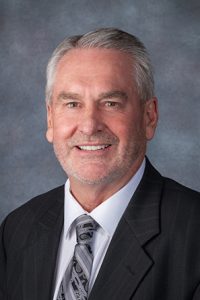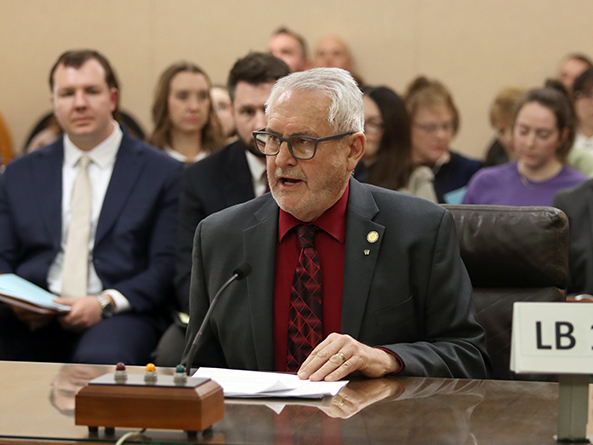Age verification proposed for adult website access
A bill that would require websites containing sexually explicit content to verify a user’s age was considered Feb. 21 by the Judiciary Committee.

LB1092, introduced by Glenvil Sen. Dave Murman, would adopt the Online Age Verification Liability Act. The bill would bar a commercial entity from knowingly publishing or distributing material harmful to minors online by requiring them to use a reasonable age verification method to verify that the person attempting to access material is at least 18 or older.
Under the bill, digitized identification cards, third-party age verification services or any commercially reasonable method that relies on public or private transactional data to verify a person’s age could constitute a reasonable age verification method.
The proposal also would allow individuals, parents or guardians harmed by an entity that violates the act’s provisions to pursue a civil lawsuit against the entity and potentially recover damages. LB1092 would not apply to any legitimate news-gathering organization or broadcaster, and internet providers would not be held liable if a minor accesses explicit content due to an entity’s failure to implement an age verification method.
Murman said nearly three out of four teens have reported being exposed to online pornography. Such content also has become increasingly violent, he said, with 90% of scenes in pornographic videos portraying physical aggression — almost always against women — which distorts adolescents’ perception of healthy relationships and sex.
“This bill protects our most vulnerable women and children,” Murman said.
Joseph Kohm testified in support of the bill on behalf of the Family Policy Alliance, an organization based out of Colorado. Age verification for pornographic websites is “crucial” in order to limit childrens’ exposure to sexually explicit content, he said. Seventy-five percent of youth have seen pornographic content by the time they reach age 17, Kohm said, and the average age at which children first encounter pornography ranges from 7 to 13.
Representing the Institute for Family Studies, Michael Toscano also spoke in support of the measure. He said children who are addicted to pornography are more likely to suffer from mental health problems, with regular pornography consumption exacerbating conditions such as anxiety and depression.
Content available on pornographic websites also can be disturbing, Toscano said, with content easily accessible that features minors, sexual assault, sex trafficking and violence.
“Pornography sites are exposing children to nothing less than moral harms,” he said.
Nate Grasz testified in support of the bill on behalf of the Nebraska Family Alliance. He said enacting age verification for pornographic websites would be consistent with other measures in place that protect children from explicit content, such as being 17 or needing a guardian’s approval to attend an R-rated movie.
“Given the harmful effects of pornography, it is dangerously inconsistent to not also require age verification for pornographic websites,” Grasz said.
Opposing the measure was Korby Gilbertson, testifying on behalf of Media Nebraska, Inc.. She expressed concern that the measure would violate the First Amendment by legislating speech. Additionally, Gilbertson said, other states that have passed similar measures are facing ongoing litigation as a result.
Jane Seu, speaking on behalf of ACLU Nebraska, also testified against the measure. Requiring age verification to access certain online content would have a “chilling effect” on protected speech, she said, and would put internet users’ privacy at risk.
“Age verification policies claim to be about internet safety, but all they do is legitimize surveillance regimes,” Seu said. “Forcing people to expose identifying information to access content online violates individuals’ right to privacy and to anonymity.”
The committee took no immediate action on LB1092.


